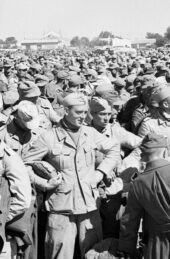Why did Japan attack Pearl Harbor?
Japan’s decision to attack Pearl Harbor has gone down in history as a short-term victory with catastrophic long-term consequences.
The Japanese leadership, already bogged down in an unwinnable war in China, were aware that they were hopelessly out matched by the industrial might of the United States. However, they believed there was no other option.
Japan had no natural resources, a growing population to feed and was encircled by Russia, Britain, France, the Netherlands and the United States; who were all furthering their interests in the Far East. Japan felt it needed to expand and increase its power base to avoid being swallowed by the Western powers and to develop as a great power in their own right.
This led to their invasion of China in the 1930s and the annexing of French Indochina in 1941. In response the United States imposed stiff economic sanctions that cut Japan’s supply of oil and raw materials. This left the Imperial Navy with only enough oil for a year. The Japanese government and military therefore saw a war with America as inevitable and an act of national self-defence that had been imposed upon them.
Takeo Yoshikawa in his memoir Japan’s Spy at Pearl Harbor stated that, ‘in the final analysis, the U.S. was the underlying cause of this war… The war finally broke out because you (Americans) did not understand Japan.’
The decision to go to war therefore originated from what was seen as two choices, to either face the humiliation of curtailing their imperial ambitions and exist as a client state of America, dependent on their iron-ore and oil. Either to become a third-class nation as Prime Minister Tōjō put it or to come out fighting.

Photograph taken from a Japanese plane during the torpedo attack
Richard Overy argues in Blood and Ruins, The Great Imperial War 1931-1945, ‘The decision was taken with a fatalistic acceptance that fighting was preferable to humiliation and dishonour.’
Japan was already a highly militarised society and at a war footing, whereas they viewed America as unprepared and unwilling to fight because of its culture of isolationism.
Nonetheless it was clear that war could not be waged on conventional lines. Japan would need to knock the United States out in one decisive engagement, destroying the morale of America and making it impossible for them to conduct war in the Pacific by forcing a stalemate. This, along with the growing pressure for America to fight the Germans on a second front in Europe, would be too much even for a power such as America and they would quickly make peace. That, at least was the strategic thinking behind the attack on Pearl Harbor and much of Japan’s long-term military thinking.
It was a terrible risk, but it presented a great opportunity. If Japan could destroy the American fleet at Pearl Harbor, the raw materials of Southeast Asia was there for the taking.
Such a complex operation would need careful planning and precise information about the disposition and defences of the US Fleet. That in itself risked exposing the whole plan. This is a major plotline of my novel Rising Tide, as seen through the eyes of Takeo Yoshikawa.
Alan Bardos is a novelist and the author of Rising Tide.





